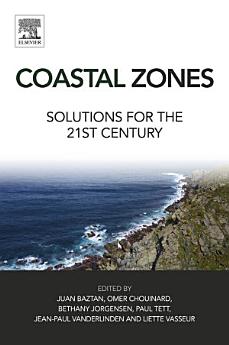Coastal Zones: Solutions for the 21st Century
Juan Baztan · Omer Chouinard · Bethany Jorgensen · Paul Tett · Jean-Paul Vanderlinden · Liette Vasseur
May 2015 · Elsevier
Ebook
376
Pages
family_home
Eligible
info
reportRatings and reviews aren’t verified Learn More
About this ebook
Coastal Zones: Solutions for the 21st Century bridges the gap between national and international efforts and the local needs for actions in communities where coastal zone challenges are faced daily. The solution-oriented approach covers issues of coastal zone management as well as responses to natural disasters. This work provides ideas on how to face the challenges, develop solutions, and localize management of common-pool resources. Coastal Zones targets academic stakeholders and coastal stakeholders who have local knowledge and experience but need a theoretical framework and a greater range of skills to make use of this experience. - Represents the collaborative work of more than 200 coastal zone researchers from all continents - Provides a transdisciplinary approach that draws on stakeholder knowledge as well as diverse disciplines in the natural and social sciences - Provides a basis for the co-development of an effective understanding of social-ecological systems in the coastal zone
About the author
After earning a double degree in geology (University of Barcelona) and oceanography (University of Perpignan) in 1998, Juan went on to receive his PhD in marine geophysics under the direction of Dr. Jean-Pierre Rehault at the Institut Universitaire Européen de la Mer and the Institut Français de Recherche pour l' Exploitation de la Mer in Brest, France. His PhD dissertation, "Formation et évolution des canyons sous- marins du Golfe du Lion : relation avec les cycles glacio-eustatiques was developed while he was working on a team led by Dr. Jean-Louis Olivet, and was presented in November of 2004. During his time as a student, he participated in eight oceanographic research cruises, including (i) the first oceanographic cruise of the research vessel Hesperides through the Exclusive Economic Zone of the Canary Islands in 1998 and (ii) in early 2000, he completed a month-long research cruise in the Bransfield Basin of the Antarctic continent. With over 50 publications, Juan's work focuses on the evolution and current state of the coastal and oceanic system, ranging from the coast to the deep sea. Much of his work incorporates his interest in the earth-human system and investigates the ways in which humans modify "natural" processes, with a specific emphasis on ethics in relation to concerns of coastal communities. In 2010, he joined Professor Jean-Paul Vanderlinden's research team at the Observatoire de Versailles SQY. Juan's dedication to interdisciplinary research has connected him with local, regional, national, and international experts through his work on projects such as (i) THESEUS: "Innovative technologies for safer European coasts in a changing climate" and (ii) ARTISTICC: "Adaptation to Transdisciplinary Research and Policy Community Centered Approach", this project seeks to analyze how knowledge, in all its dimensions, can be mobilized to foster coastal adaptation to climate change. Also, since 2007, Juan has drawn from his firm commitment to collaborative, ethical, and interdisciplinary research to coordinate Marine Sciences For Society: a network of concerned scientists working to enhance the dialogue between marine scientists and society as a whole.Professor at the Université de Moncton, for several years, Omer Chouinard has worked with the Southern Gulf of St. Lawrence Coalition on Sustainability, fishermen's unions, watersheds organizations in New Brunswick, and with many coastal and island communities. He was part of the Canadian aquaculture research network, AQUANET, and is often called as an expert on issues of integrated management, coping, and social economy.Bethany Jorgensen graduated from the University of Chicago in 2008 and is currently a graduate student at the University of Maine. She has been an editor for Marine Sciences For Society since 2009, and became a co-coordinator of the group in 2014.After a career in oceanography, studying especially the links between phytoplankton and physical processes, Paul Tett is now Reader in Coastal Systems at the Scottish Association for Marine Science, thinking about the relationships between coastal ecological and social systems.Jean-Paul Vanderlinden is a Professor of Environmental Studies and Ecological Economics at the Université de Versailles Saint-Quentin-en-Yvelines (UVSQ). Additionally, he is the coordinator of the "Adaptation Research, a Trans-disciplinary Transnational Community and Policy Centred Approach project from the International Group of Funding Agencies for Global Change Research.
Rate this ebook
Tell us what you think.
Reading information
Smartphones and tablets
Install the Google Play Books app for Android and iPad/iPhone. It syncs automatically with your account and allows you to read online or offline wherever you are.
Laptops and computers
You can listen to audiobooks purchased on Google Play using your computer's web browser.
eReaders and other devices
To read on e-ink devices like Kobo eReaders, you'll need to download a file and transfer it to your device. Follow the detailed Help Center instructions to transfer the files to supported eReaders.




